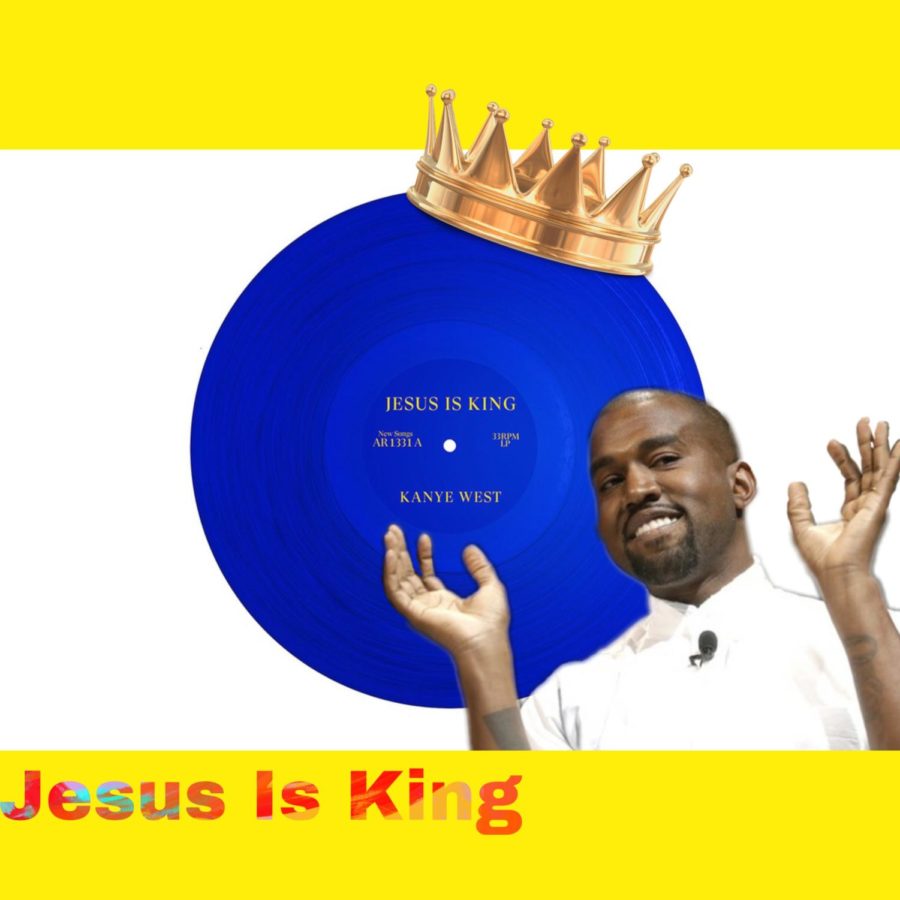Jesus is King by Kanye West
Reviewing Kanye West’s ‘Jesus Is King’: A Revival of the Antiquated
November 1, 2019
Christianity, is the unwavering focus of Kanye West’s gospel album, a richly produced but largely flawed record about one man’s love of the Lord and himself. On his ninth album, West turns to religion as his muse. It leads to moments of undeniable beauty, but little to hold onto.
Kanye West never stopped talking about God. From his breakout “Jesus Walks” to last year’s album, Ye, religion has always been, if not a fixation, than a thematic concern, something to pick at and analyze, to mythologize and aid in his own self mythologization. While his ninth album, Jesus Is King, is his first to be classified as religious music, it’s also the latest entry in a public diary West has been writing for 15 years, in which his relationship with Christianity is constantly shifting.

Incidentally, West has almost influenced the souls of our Mustangs with his vocals and beats leading junior Ian Gamboa to say, “Kanye really gave it his all in this new drop.” Gamboa continued and said, “I’ve been listening to Kanye for years and it’s clear that his lyrics are coming from the heart.”
“I don’t attest to any religion that tells me that other people gotta go to hell,” West said in 2008. “I don’t believe in a religion that has something against gay people. That has something against Muslims. That has something against Buddhists. You know? And I don’t really believe in any of that. I really believe in absolute truth.” His thoughts have undoubtedly evolved in the decade since.
On Jesus Is King, West’s relationship with Christianity and the Church is simpler. He’s no longer poking at contradictions, but reveling in a newfound zeal. Though the album is not, strictly stylistically speaking, a gospel record, its steadfast call to worship is its defining feature. The scope here is narrow, a distillation that clearly brings West some measure of comfort, but it comes with a simplification of the music itself.
Like every Kanye West album, Jesus Is King is filled with moments of undeniable brilliance. Though it will likely be placed alongside last year’s Ye as a distinctly lightweight entry in his canon (thanks in part to a brisk 27-minute runtime), the album reminds us that even West’s lesser work can be capable of extreme dynamism. The sample of a 1974 tune by Christian soul act Whole Truth on “Follow God” is neck-snappingly good, the kind of textured punch that, still, only West seems capable of; the effervescent triumph of the “On God” beat, the result of a Pi’erre Bourne collaboration, is one of the most immediate joys available on Spotify right now; “Use This Gospel” is a glowing deployment of the stylistic muscle West developed on 2013’s Yeezus.
However, the strength of those moments are often derailed by the presence of West himself. Take “Selah,” the album’s true kick-off after his Sunday Service Choir’s introduction, and the first inessential album opener in West’s oeuvre. It’s a sweeping epic, lightly affected organs opening to bludgeoning percussion and a crescendoing choir singing only “hallelujah,” nearly unaccompanied, for 45 seconds. It’s the kind of drama West can orchestrate in his sleep, and few others can convincingly execute. His rapping, though, capsizes the vessel. Sounding as if he were recorded from one room over, West is no longer the brash bandleader standing in the center of the storm. Instead, he’s simply hanging on, delivering slightly more focused versions of screeds delivered last week in lengthy interviews. It’s no secret that West’s albums are often mined from whatever it is he’s thinking about at that moment, but before his latest pivot he at least tried to add punchlines to his verses.
Time and time again on Jesus Is King, West’s presence front and center weakens his work as a producer. Kanye’s rise is inseparable from his drive to prove people wrong: 15 years ago, a host of detractors told Kanye not to rap, he dedicated a 13-minute spoken word outro to the struggle on his debut album, and the world would be worse off if he’d listened. On Jesus Is King, you begin to see where they may have been coming from.
Lately, West is not as dedicated to stirring up controversy on record as he is speaking off the cuff. While Jesus Is King certainly has moments echoing some of his less endearing public turns, briefly referencing the 13th Amendment, retrograde riffing on women staying off Instagram, claims that merch sales count as tithing, it’s typically getting more tough to grasp what, exactly, he’s trying to say. While critics always focused unfairly on West’s technical prowess, a forceful clarity of vision was never in question. Here, he often cedes a point of view, or any sort of detail. God saves, and that’s all you need to know of the matter.
Nowhere is the view muddier than on “Closed On Sunday,” featuring a newfound, poorly articulated dedication to women’s purity in the social media age. Ostensibly a love song directed at Kim Kardashian West, he solemnly intones “Hold the selfies, put the ‘Gram away / Get your family, y’all hold hands and pray.” It doesn’t work, and makes less sense when he elaborates. But in typical Westian fashion, the song dramatically shifts, and very nearly redeems itself. Singing with admirable vulnerability, he invokes some reliable Old Testament imagery, Jesus Is King is filled with demons quaking before an almighty power — an earnest attempt to get his point across that ultimately characterizes this project.
The plaintive, direct singing mode is West’s best delivery vehicle across the album. The rapping is uniformly lackluster when not delivered by one of the brothers Thornton in their return as legendary rap duo Clipse. Yet when West sings, it becomes clear how urgent this album is for him (of course, those moments are in turn undercut by his meandering on songs like “Water”). It’s unlikely that any listener would select “God Is” as the strongest entry on Jesus Is King, but it admirably lays out what West is attempting to do. Voice straining, he literally tries to enumerate what God is to him. On that front it barely coheres, but the delivery sells how deeply felt these convictions are. It’s not the highest peak available, but it’s one of the only plainly endearing sections.
Like many of West’s later albums, Jesus Is King is filled with songs that echo earlier moments in his catalog. “God Is,” with its straightforward address to the listener, sent me back to “Only One,” one of two West collaborations with Paul McCartney. The epistolary song, written from the perspective of West’s deceased mother Donda assuring her son that she’s proud of him, encapsulates much of what Jesus Is King strives towards before falling short. Daring, spiritual, and deeply personal, it includes lines like “You’re not perfect, but you’re not your mistakes,” merciful asides that gesture at the kind of comfort the Church offers. The writing that pulls off that difficult task seems woefully out of reach on Jesus Is King. Unfortunately, it’s the sort of work that would have made this album into something transcendent.
If West really, truly believed that it could save someone’s, everyone’s, immortal soul, you wish he had tried a little harder. Fresh man, Niko Rodriguez gave his opinion on the Kanye’s efforts stating, “Kanye could have tried a bit harder in how he went about his lyrics.” Rodriguez elaborated on that statement and said, “but I feel like he got his overall message out there.” However for the most part, West’s album in a sense captures the beauty of what religion can do for an individual and how it can truly cleanse the soul of yourself, and those around you.


